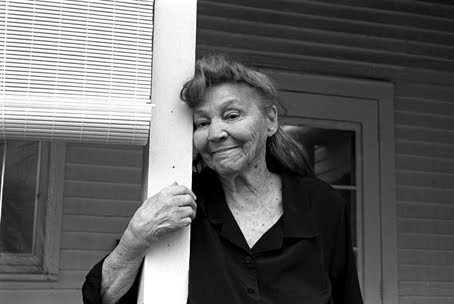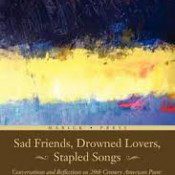Sad Friends, Drowned Lovers,
Stapled Songs:
Conversations and Reflections on 20th Century American Poets
By Chard deNiord
Marick Press
It’s difficult to recall a book published in recent years that has contained as much poetic wisdom as Sad Friends, Drowned Lovers, Stapled Songs, a collection of interviews and essays on senior American poets including Jack Gilbert, Maxine Kumin, Galway Kinnell, Ruth Stone (pictured above), Donald Hall, Robert Bly, and Lucille Clifton.
Many significant critical studies of poetry are published each year, offering trenchant insight into the art, but that is the wisdom of the critic. Good criticism is always creative, and aims to ravish. But isn’t poetry.
The interview form allows poets to give voice to personal interests, eccentricities, and obsessions in a way that often, but not always, supplements their poetry, as a libretto supplements an aria. That is one reason reading Sad Friends, Drowned Lovers, Stapled Songs is so satisfying. These interviews and essays edited by poet, scholar, and teacher Chard deNiord, are full of interesting characters. As editor and interviewer, deNiord balances sensitivity and knowledge in his presentation. Each of the seven interviews included here begins with an introduction that provides information on the writer, but, more importantly, sets the scene of the interview. Particularly interesting is the interview with Ruth Stone, which deNiord writes, “almost didn’t happen.”
Although I had carefully arranged a date and time with Ruth Stone on the phone to meet, Ruth asked each time I called who I was and what this interview was for. I would later discover this was a ruse Ruth had devised to discourage me as an unknown visitor from meeting with her since her daughter and caretaker, Marcia Croll, was out of town, and she felt vulnerable as a 93-year-old woman living alone.
Arriving at Stone’s home in Middelbury, Vermont, deNiord is greeted with a locked door. Finally, it is deNiord’s wife who persuades Stone to open up. When this happens, deNiord writes, “I felt immediately that I was in the presence of a powerfully vatic woman.” Stone’s reticence and seeming senility set the reader up for shock when Stone turns out to be a masterful interviewee, reciting long stretches of her poetry from memory and commenting on nine decades of life and writing.
Jack Gilbert is even more eloquent and opinionated, both about his own work and on the state of American poetry. His interview is full of stoic and at times humorous revelations, as well as more than a few moments where Gilbert’s dead-honest, personality shows through. Asked about changes he has witnessed in American poetry, Gilbert responds:
I hate to say it, but it’s true, at these writing conferences it’s all about fixing up a poem so it will sell. Nobody wants to talk about how a poem works, what its purpose is. They all want to deal with the outside of the poem… Hardly anybody talks about the strategies of poetry, or how you make poetry live, how to use concrete detail rather than similes, goddamned similes, the weakest kind of resource there is in poetry. People are so much in love with similes. It’s a pity. …
[Poetry] is one of the major ways of keeping the world human. We have almost nothing else, no craft that deals specifically with feeling. The novel to some extent, but it embodies a different kind of empathy than a poem does, and I suppose film to a degree, but motion pictures are only able to show you the outside of what’s happening. Poetry works on the inside of what’s happening.
Throughout this collection, deNiord appears as both a willing and knowledgeable interviewer, prepared with questions that help sculpt the conversation, and always willing to digress, yet able to pull the poet back on course. His appreciation of these poets’ work was the obvious impetus for each of these interviews, which were conducted over several years. And it is deNiord’s sensitivity to his subjects that allows him to lead the poets on, and to gently prod them when they seem reluctant or digressive.
Nowhere is this more evident than in deNiord’s interview with Lucille Clifton, with whom deNiord takes a more active role than with any other poet in the book. Clifton is somewhat reticent at first, but finally the interview is one of the longest in the book. It begins this way:
Chard deNiord: Thank you for meeting with me today, Lucille. There’s so much I’d like to talk about, I’m not sure where to begin exactly so I’d like to jump around a bit if that’s all right with you.
Lucille Clifton: My mind jumps around.
CD: Mine too.
LC: It reminds me of a time I was not feeling well years back and they wanted to figure out whether I was losing my mind, or something like that. They told me I was saying odd things.
CD: But you’ve been saying odd things your whole life!
It is this friendly familiarity, coupled with deNiord’s keen insight into the work of these poets, that make these interviews so artful. As both guide and follower, deNiord prompts each poet to deeper revelations than they might otherwise have offered. From Gilbert’s full-throated opinions on contemporary poetry, to Clifton’s meditations on her own work and Langston Hughes, to Robert Bly’s discussion of James Wright, and further on, each of these poets speaks clearly and clarifyingly on what matters most: Life and the word.
Anyone seeking greater insight into the work of these vital American poets, or seeking examples of the fine craft of interviewing, would do well to read this knowledgeable and sensitive book.
—Stephan Delbos

